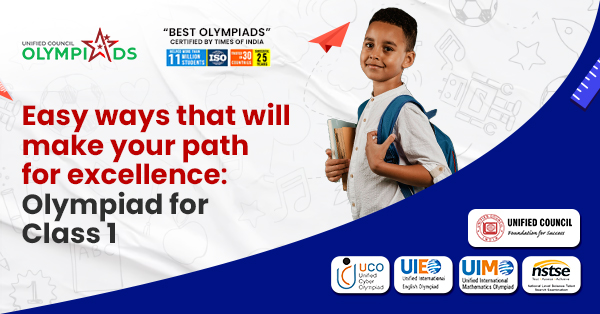
Posted at - 01-Apr-2024
From the very beginning, Olympiad exams nurture academic excellence.
How? The answer is simple, It’s the well-defined structure.
And Why trust us? Because we have had a proven formula for parents and teachers, specifically for Class 1 students, for almost over two decades.
Let’s delve in so that you can see changes in your child's Olympiad preparation from day 1.
Olympiad exams are not only tests and scores but also the introduction of budding scholars. It is a competitive yet rewarding platform. With our application-based approach, students will have more balance in their academic journey.
As we have seen over the years participating in Olympiads sharpens a child's intellect, It helps to:
Olympiad exams seem a bit unclear. But we have the proven exam-ready structure approach for Class 1:
Different Types of Olympiad Exams
Class 1 students typically face Olympiad exams in Mathematics, Science, English, and General Knowledge. Here's an overview:
Each varies in its approach and area of focus, so understanding the core objectives is essential.
Success in Olympiad, for Class 1, is depending upon the preparation.
For children, their schedules should align with playtime and learning at school. Short study session topics are more effective than longer ones. So you know, it is always consistency and repetition.
Analyze the exam pattern and focus on the frequently asked themes. In Mathematics, basic arithmetic operations and simple problem-solving. In Science, understanding nature, and engaging in simple experiments. For the English, the alphabet and basic grammar. And in General Knowledge, the world around them and their immediate environment.
We all know how practicing sample questions and taking mock tests bring a sense of familiarity. Moreover, it helps in managing time, pressure, and nerves—vital skills for exam day. Also, if you ask for Class 1 students, the practice should be gentle and engaging to build confidence.
Our past research shows that Class 1 students are fast learners. So the techniques are always focused on the preparation into an interactive and enjoyable one.
We have an idea of the impact of visual learning. For an example-Utilizing flashcards, and images are fun for the young ones.
Games, puzzles, and interactive apps are simple and enjoyable for the little ones. We have also observed this design is to make learning games fast, like integrating quizzes.
We have seen changes when parents ask open-ended questions on a day-to-day basis. Also, storytelling, and discussing everyday concerns can build the Olympiad spirit.
Parental involvement for Class 1 students is undeniable.
Designate a study area at home that is free from distractions and stocked with all the necessary learning materials. Ensure that this space is inviting and conducive to study.
Celebrate small victories and progress. Because praise encourages children to maintain a positive attitude toward learning.
Regular communication is important with teachers. It helps to track the child's progress for more attention.
Learning how to manage stress for the kids is an important lesson for the exam day.
Our most effective learning was practicing simple breathing exercises and meditation. Involve your child in techniques like small physical activities and practice them together.
With all these in mind, ensure your child gets rest and nutrition during the preparation. At the end of the day, encouraging acts as stress-busters, so your child has a mindful study time.
As parents, educators, and mentors, you know you have to guide and prepare these young minds to face the world. And the written process for excellence, the medals, and certificates are byproducts.
So this blog is the first step for engaging with Olympiad preparation. The key is to make the process as seamless, enjoyable, and interactive as possible. The value to the young ones is to inspire a lifelong love for learning and exploration.